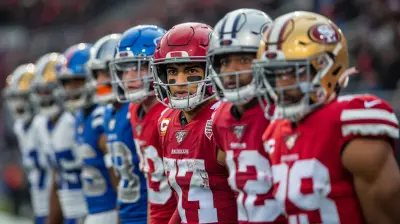The Role of Football Managers: More Than Just a Tactician
14 February 2025
Football is the beautiful game, and while the players are often the ones in the spotlight, there’s one key figure who plays an equally vital, if not more strategic, role in a team’s success: the football manager. Most people think these managers are just tacticians, drawing up game plans and formations. But honestly, they do way more than that. They're the heartbeat of the team, guiding every aspect of the squad's development, from the training ground to the final whistle on match day.
If you’ve ever wondered what football managers really do or how they influence the game beyond tactics, this article will open your eyes. Let’s dive deep into the multifaceted role of football managers and see why they are much more than just the person calling the shots on the sideline.

The Football Manager's Role: Beyond the Clipboard

1. The Master Strategist
Okay, let’s start with the obvious: tactics. Yes, football managers are responsible for developing the tactical blueprint for their team. Whether it's a 4-4-2, 3-5-2, or the ever-popular 4-3-3, managers craft the formation based on their philosophy, the strengths of their players, and of course, the opposition.But here's the thing—tactics aren't as simple as drawing some arrows on a whiteboard. It's about understanding the nuances of the game and making adjustments in real-time. Managers must anticipate how their opponents might play, identify weaknesses, and figure out how to exploit them. It’s like a high-stakes chess match, where every move could be the difference between winning and losing.
However, tactics don’t end when the whistle blows. During the game, managers are constantly tweaking formations, making substitutions, and adjusting strategies based on what's unfolding on the pitch. It’s a dynamic process that requires quick thinking and a deep understanding of the game.

2. The Motivator and Leader
If you think a football manager’s job stops at tactics, you’re only getting part of the story. A huge part of their role is being a leader—a figure who inspires, motivates, and drives the team forward.Think about it: managing a group of 20+ individuals, each with their unique personalities, backgrounds, and egos, is no small feat. Some players might need a gentle push, while others may need a firm hand. Great managers understand this and know how to get the best out of each player. They’re like a conductor of an orchestra, ensuring every instrument plays in harmony.
Ever wonder why certain teams seem to fight harder, run faster, and refuse to give up under specific managers? It’s no coincidence. The manager’s ability to instill belief and purpose can turn an ordinary squad into champions. Sir Alex Ferguson is a perfect example of this. His ability to motivate and command respect led Manchester United to unprecedented success during his time in charge.
3. The Man-Manager
In addition to being a tactician and motivator, football managers are also incredible people-managers. Let’s face it, footballers are human, and like all of us, they face off-the-pitch issues—family problems, personal challenges, and even mental health struggles. A top-class manager doesn’t just focus on what happens on the pitch; they care about the well-being of their players.Knowing when to give a player a break, how to manage squad rotation to prevent burnout, and even understanding the psychology of players is crucial. The modern football manager has to be emotionally intelligent and empathetic, balancing the demands of the game with the personal needs of the players.
For instance, Carlo Ancelotti is renowned for his calm and composed approach, earning him respect from players across the globe. His ability to maintain a harmonious dressing room has been key in his successful managerial career in top European clubs.
4. The Talent Developer
A football manager isn’t just responsible for the current crop of players; they also have an eye on the future. Developing young talent is a crucial part of the job. Managers oversee the development of youth academies, scouting, and nurturing promising players to become the stars of tomorrow.Take Pep Guardiola at Barcelona, for example. He brought through a generation of young players like Lionel Messi, Gerard Piqué, and Sergio Busquets, who became the backbone of one of the most dominant teams in football history.
A good manager recognizes potential and knows how to develop it. They offer guidance, provide the right opportunities, and create an environment where young players can thrive. It’s a long-term process, but the payoff can be massive for both the player and the club.
5. The Crisis Manager
Football has its ups and downs. Injuries, suspensions, and disappointing losses are all part of the game. When things go wrong, it’s the manager who’s in the firing line. How they handle adversity can define their career.Some managers thrive under pressure, using setbacks as an opportunity to galvanize the squad and turn things around. Others crumble, unable to cope with the weight of expectations. But make no mistake, crisis management is a skill in itself.
Take Jürgen Klopp’s 2020/21 season with Liverpool. Injuries to key players like Virgil van Dijk could have derailed their entire campaign. Instead, Klopp managed to keep the team competitive and guided them to a respectable finish. It’s moments like these that separate the good managers from the great ones.
6. The Media Spokesperson
Whether in pre-match press conferences or post-match interviews, football managers are constantly in the spotlight. This part of the job might seem trivial, but it’s far more important than you might think.Every word a manager says is scrutinized by the media, fans, and sometimes even the players. Managers have to strike the perfect balance between protecting their team and being honest with the public. A poorly chosen comment can divide a dressing room or create unnecessary headlines.
Managers like José Mourinho have mastered the art of media management, often using press conferences to deflect attention away from their players and onto themselves. It’s a subtle form of psychological warfare, and when done correctly, it can take the pressure off the squad.
7. The Tactical Innovator
While some managers stick to tried and tested methods, the best of the best are always looking to innovate. They push the boundaries of traditional tactics and come up with new approaches that revolutionize the game.Pep Guardiola’s “tiki-taka” at Barcelona, for instance, was a game-changer. His emphasis on possession football and intricate passing patterns set a new standard for how the game could be played. Similarly, Marcelo Bielsa’s high-pressing, high-energy style has influenced a new generation of coaches.
Innovation might not always guarantee success, but it shows a manager's willingness to evolve and adapt. Football is constantly changing, and staying ahead of the curve is what separates the visionaries from the rest.
8. The Club Ambassador
Finally, football managers are often the face of the club. They represent the organization in public, to the fans, and even in board meetings. Their behavior, demeanor, and attitude reflect the values of the club they serve.A manager who commands respect and behaves with integrity can elevate the status of a club, while a controversial figure can tarnish its image. Managers like Arsène Wenger, for example, embodied the ethos of Arsenal Football Club, promoting values such as respect, teamwork, and professionalism throughout his tenure.

Conclusion
At first glance, it might seem like a football manager’s job is just about tactics—setting up formations and making substitutions. But as we’ve explored, being a football manager goes far beyond that. From being a master strategist to a motivator, talent developer, crisis manager, and even a media spokesperson, the role is incredibly diverse and demanding.The best managers are those who can balance all these responsibilities while maintaining a clear vision for their team. They’re the ones who inspire greatness, not just in terms of results, but in how they lead, develop, and manage both the game and the people involved in it. So, the next time you see a manager pacing the sidelines, just remember—they’re doing a lot more than meets the eye.
all images in this post were generated using AI tools
Category:
FootballAuthor:

Onyx Frye
Discussion
rate this article
16 comments
Wolf Russell
Football managers: part tactician, part therapist, all-around legends!
March 31, 2025 at 7:07 PM

Onyx Frye
Absolutely! Football managers wear many hats, blending strategy with emotional intelligence to inspire and lead their teams.
Quill Cruz
Great insights! Leadership is key in sports.
March 26, 2025 at 8:25 PM

Onyx Frye
Thank you! I completely agree—effective leadership truly elevates a team's performance.
Sabina Marks
Leadership and strategy define their impact.
March 25, 2025 at 5:41 AM

Onyx Frye
Absolutely! Leadership and strategy are crucial, as they shape not only game tactics but also team culture and cohesion.
Easton Williams
This article beautifully captures the multifaceted role of football managers. Their influence extends beyond tactics, shaping team culture and player mentality. It's a reminder that leadership in sports is as much about inspiration and connection as it is about strategy. Great insights!
March 21, 2025 at 3:23 AM

Onyx Frye
Thank you! I'm glad you found it insightful. Football managers truly do play a vital role in shaping both performance and team spirit.
Zanthe Hill
Great insights! Football managers indeed shape not just tactics but also team spirit and resilience. Their impact extends beyond the pitch, fostering growth and unity. Truly the unsung heroes of the game!
March 15, 2025 at 8:47 PM

Onyx Frye
Thank you! I completely agree—football managers play a crucial role in building team culture and resilience, which often leads to success on and off the pitch.
Faenor McDowney
Football managers: part tactician, part cat herder!
March 14, 2025 at 1:34 PM

Onyx Frye
Absolutely! Managing a football team requires not just tactical know-how but also strong leadership and interpersonal skills to unify diverse players and manage their personalities effectively.
Bear McCartney
Football managers: part tactician, part magician! They conjure up strategies while simultaneously keeping players from turning the locker room into a soap opera. Who knew coaching came with a side of drama?!
March 11, 2025 at 9:31 PM

Onyx Frye
Absolutely! Football managers juggle tactics and team dynamics, making their role both strategic and deeply influential in maintaining squad harmony. The drama is all part of the game!
Finnegan McCabe
This article brilliantly highlights the multifaceted role of football managers. Beyond tactical expertise, their leadership, emotional intelligence, and ability to inspire players are crucial for team success. Understanding these dimensions enriches our appreciation of the managerial position in football and its impact on performance.
March 11, 2025 at 5:56 AM

Onyx Frye
Thank you for your insightful comment! I completely agree that a manager's leadership and emotional intelligence are vital for a team's success. It's about much more than just tactics.
Marie Miller
Football managers: part tactician, part therapist, and full-time coffee drinker. They strategize on the pitch while juggling egos, all while trying to find a spare pair of socks for that one player who never seems to have any!
March 10, 2025 at 1:25 PM

Onyx Frye
Absolutely! Football managers do much more than strategize; they balance team dynamics, support player mental health, and navigate everyday challenges, making their role truly multifaceted.
Annette McLean
Football managers play a crucial role that extends beyond tactical decisions. They are leaders, motivators, and strategists, shaping team culture and player development. Their ability to manage relationships and adapt to various challenges is vital for achieving both short-term success and long-term stability within the club.
March 9, 2025 at 8:46 PM

Onyx Frye
Absolutely, football managers are key to a team's success, influencing culture and development while navigating challenges beyond just tactics. Their leadership shapes the club's future.
Raine Middleton
Great managers inspire resilience and unity beyond tactical decisions.
March 6, 2025 at 7:45 PM

Onyx Frye
Thank you! Absolutely, great managers foster a strong team culture that transcends tactics, emphasizing unity and resilience as key pillars of success.
Carina McNaughton
Football managers are not just tacticians; they are visionaries, motivators, and mentors. Their leadership shapes players’ lives and team spirit, proving that success transcends strategy. Together, they inspire greatness on and off the pitch!
March 4, 2025 at 3:27 AM

Onyx Frye
Absolutely! Football managers play a crucial role beyond tactics; their vision and mentorship inspire players and foster a strong team spirit, contributing to success both on and off the pitch.
Zoey McInnes
Football managers are crucial beyond tactics; they inspire, motivate, and shape team culture, influencing success on and off the pitch.
March 3, 2025 at 9:05 PM

Onyx Frye
Absolutely! A manager's influence extends far beyond tactics; their ability to inspire and foster a strong team culture is vital for both on-field success and off-field cohesion.
Meagan Cruz
This article brilliantly highlights the multifaceted role of football managers beyond tactics. It’s a reminder that their leadership, motivational skills, and ability to nurture talent are just as crucial to a team's success. A well-rounded perspective on this often underestimated aspect of the game!
February 27, 2025 at 9:11 PM

Onyx Frye
Thank you for your thoughtful comment! I’m glad you found the article's perspective on the broader role of football managers valuable.
Cassandra Pruitt
Great insights! It’s vital to acknowledge the emotional and psychological support managers provide, shaping not just teams, but individuals, too.
February 27, 2025 at 1:09 PM

Onyx Frye
Thank you! Absolutely, the emotional support from managers plays a crucial role in individual and team development.
Carla McKee
Great insight! Managers shape team spirit too!
February 25, 2025 at 9:05 PM

Onyx Frye
Thank you! Absolutely, a manager's influence extends beyond tactics to fostering a positive team culture and spirit.
MORE POSTS

Southpaw vs. Orthodox: Tactics and Techniques

The Emergence of Football Academies and Their Global Impact

How VAR Has Changed the Face of Football

Best Available: What Happens When Your Top Target is Taken?

Drafting for the Future: Why Development Matters

The Journey to Immortality: Athletes Who Broke Every Record

What Happens to Athletes Caught Doping?

Strategies for Managing Multi-Generational Teams in Sports

The Role of Technology in Modern Olympic Training

The Rise of Esports and What It Means for Traditional Sports Marketing